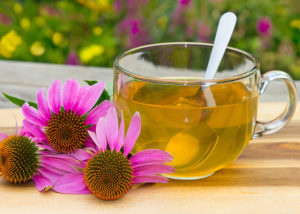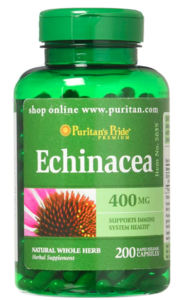Echinacea: Nature’s Cold Remedy
For hundreds of years, Native Americans used echinacea as a medicinal herb. It was used by every Native American tribe to treat almost every type of medical ailment including coughs, sore throats, toothaches, cramps and septic diseases. They even used it as a laxative.
Commonly known as purple coneflowers, echinacea are a group of beautiful purple-hued daisies with large spiny cone-shaped heads that light up the Midwest in mid-summer. There are nine known species of echinacea, all of which are native to North America. They are beautiful flowers that look great in any mulch bed. They are also a popular immune building herb.
 Echinacea was first used in the U.S. medical profession in the 1880s as several physicians started treating patients with different combinations of echinacea and other herbs. Echinacea was considered an antiseptic and “corrector of body fluids.” It was also considered a strong immune builder. It was used widely in American medicine until about the 1930s, when for some reason American doctors just stopped using it.
Echinacea was first used in the U.S. medical profession in the 1880s as several physicians started treating patients with different combinations of echinacea and other herbs. Echinacea was considered an antiseptic and “corrector of body fluids.” It was also considered a strong immune builder. It was used widely in American medicine until about the 1930s, when for some reason American doctors just stopped using it.
For the next 50 years, German doctors carried the torch as they continued to research echinacea and use it as medical treatment. They began to examine what compounds in the herb might provide immune stimulating protection against colds, flus, viruses and infections. They found that some of the active substances in echinacea may have antimicrobial and antiviral properties, while others may support the immune system. While there are over 400 publications about echinacea, the true identity of all the active substances in this herb still remains uncertain.
Echinacea is one of the top 5 selling herbs on the U.S. medicinal herb market. It’s primarily promoted as an immune modulator that reduces symptoms of the common cold. Echinacea has been identified as having anti-inflammatory, antioxidant, and antiviral properties.
In a meta-analysis of fourteen studies that included a total of 1,630 participants, scientists found that echinacea was effective in reducing the chances of getting a cold by 58%. The study also found that the herbal remedy reduces average duration of a cold by 1.4 days. Looks like our Native American friends were on to something.
There are currently more than 800 echinacea products available, including tablets, extracts, juices, and teas. Three different species of the plant are commonly used, and various parts of the plant are used in different products.
The various constituents of echinacea—alkamides, polysaccharides, and caffeic acid derivatives—have been proposed as the factors that have beneficial effect. But no one really knows for sure what active ingredients of the plant really work at preventing colds and improving immune function.
There are over 200 different viruses capable of causing the common cold. One study found that echinacea was only 35% effective against rhinovirus-induced colds. But with a 58% effectiveness on all colds, this herbal remedy might be worth considering as a routine supplement during cold and flu season. Also, the studies indicated that echinacea was more effective at preventing a cold than curing a cold.
As scientists are looking at possible treatments, preventions or cures for Sars-CoV-2, they are starting to consider any substance that might affect coronaviruses. Guess what? The common cold is a type of coronavirus.
 A study released a couple of months ago looked at the effect of echinacea on SARS and MERS coronaviruses in a petri dish. Both of these coronaviruses were rendered irreversibly inactive by a product call Echinaforce. The researchers concluded that Echinacea preparations could be effective as a preventative treatment for all forms of coronaviruses including SARS-CoV-2.
A study released a couple of months ago looked at the effect of echinacea on SARS and MERS coronaviruses in a petri dish. Both of these coronaviruses were rendered irreversibly inactive by a product call Echinaforce. The researchers concluded that Echinacea preparations could be effective as a preventative treatment for all forms of coronaviruses including SARS-CoV-2.
Another study was published in India in May 2020 examining Echinacea’s ability to prevent or slow down a Sars-CoV2 infection. Echinacea was once again successful in rendering the virus inactive in a laboratory setting.
This makes sense because polyphenols, one of the active components in Echinacea, have been shown to inhibit entry of coronaviruses into lung cells by blocking ACE2 receptors.
I am in no way suggesting that Echinacea will prevent or cure coronavirus. But I do think it’s important to know that this herb is 58% effective at preventing the common cold, and scientists are starting to examine its effectiveness against the SARS-CoV2 virus.
Nothing will improve your immune system more than The Big Three—Exercise, Nutrition, and Sleep. Taking a supplement should never be a substitute for getting proper exercise, nutrition and sleep.
If you’re taking care of the Big Three and you want an extra boost for cold and flu season, you might consider echinacea. Maybe start with tea and go from there. Anything that is 58% effective in reducing colds sounds pretty appealing.
Echinacea is available over the counter at pharmacies, health shops, and online—dried, in teas, as liquid extracts, or in capsules. We happen to like this pill form.
Also remember, with any supplement, consult your physician first.
Stay Strong and Healthy,
Bo Railey

